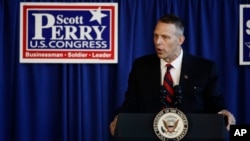Democratic energy in the perennial battleground state of Pennsylvania is raising questions about President Donald Trump's ability to replicate his stunning 2016 win in a state Republicans hadn't carried for nearly two decades.
Democrats animated by an anti-Trump fervor scored big victories in county and municipal races across Philadelphia's suburbs in 2017, reminding them of post-Watergate Republican losses. Four months later, Democrat Conor Lamb embarrassed Republicans in a nationally watched special election in a Pittsburgh-area congressional district that Trump had won by 20 percentage points.
Then, in November's midterm election, the GOP's Trump-hugging candidates for governor and U.S. Senate got pounded by double digits, while the party lost three more congressional seats and, for the first time in modern history, a majority of state legislative seats in Philadelphia's suburbs.
Now, Republicans are picking up the pieces and, in some quarters, calculating that those performances mean nothing good for Trump's chances at carrying Pennsylvania in the 2020 presidential election.
Those farther away from the biggest metropolitan areas seem untroubled by it. With 20 electoral votes, Pennsylvania is a huge prize in the race for the White House, and Trump carried it by driving up his support with white, working-class voters far from Philadelphia and Pittsburgh.
But many Republican Party figures in Pennsylvania's largest metro areas question whether Trump can raise another wave among rural voters and conservative Democrats, who are credited with carrying him past Democrat Hillary Clinton by less than 1 percentage point.
They are particularly wary of a supercharged anti-Trump coalition of liberal voters and moderate suburbanites that powered Democratic victories in 2017 and 2018 and inflicted losses on Republicans unlike anything seen 2016, when a similar coalition formed.
Alan Novak is among them.
The former four-term state party chairman from Chester County wonders whether Trump “fatigue” in 2020 will diminish the huge margins elsewhere that helped Trump overcome heavy losses in Philadelphia and its suburbs in 2016.
“I'm sure his base is still solid,” Novak said. “But is that base enough?”
Predicting the future with Trump is, of course, particularly fraught.
There's the constant turmoil of Trump's administration and the prospect that more bad news could emerge from the investigation by special counsel Robert Mueller into whether Trump's campaign coordinated with Russia.
Plus, who knows what kind of nominee Democrats will produce?
“He's certainly got an excellent chance, especially because we have no clue who the Democrats will put up,” said Richard Stewart, who co-chairs the state Republican Party's central committee caucus. “If they put up a real left-wing type, which seems like all they have anymore, I think it'll be much easier.”
Trump became the first Republican presidential nominee to win Pennsylvania since 1988, but didn't necessarily need to win Pennsylvania to capture the White House. Rather, Pennsylvania - the nation's fifth-most populous state - was part of a bloc of four industrial-belt “blue wall” states that handed victory to Trump after Democrat Barack Obama won them twice.
If anything, Democrats need Pennsylvania in a worse way: Harry Truman in 1948 was the last Democrat to lose Pennsylvania and win the White House.
Democrats viewed 2016 as a wake-up call and say they will be more prepared to fight for Pennsylvania. As soon as Trump won in 2016, the party began planning on a comeback in 2020.
Pennsylvania's Republican Party chairman, Val DiGiorgio of Chester County, said cities and suburbs are not irrevocably hardened against Trump. But, he suggests, the president needs to hedge his bets and bring a message to those voters.
One Trump voter, Tony Sciullo of suburban Pittsburgh, has continued to sour on Trump, sometimes disagreeing on policy and almost always disliking Trump's behavior. Sciullo, a registered Republican, calls Trump the “most un-Republican Republican ever,” one whose credibility is marred by a self-serving attitude and personal attacks on others.
Republicans in Pennsylvania's exurbs and rural areas, however, question any change in strategy. Trump's base is solid and the economy is just fine, they say.
In Armstrong County, where 2016 turnout was among the state's highest and Trump beat Clinton by 3 to 1, voters are as enthused about Trump as they were two years ago, said Mike Baker, the county's GOP chairman.
Trump can win again without the cities and suburbs, Baker said.
“He did last time,” Baker said.
In Westmoreland County, where Trump's vote margin was the second-biggest of any Pennsylvania county, GOP Chairman Kerry Jobe said the party's November's losses weren't a referendum on Trump, partly because some loyal Trump voters didn't make the effort to vote.
It'll be different when Trump is on the ballot and showcases a four-year record, Jobe said.
“Are you better off? Is the country better off?” Jobe said. “That's the question.”




